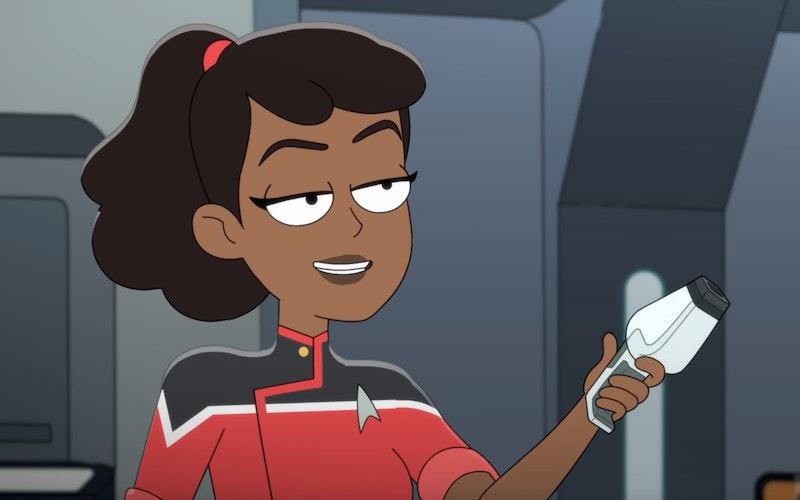
TV
Higher Purposes and Star Trek: Lower Decks
On the distant planet K’Tuevon Prime, four officers of the United Federation of Planets—the galactic coalition at the center of the Star Trek franchise—stand before an inquisitor called Clar (voiced by Kurtwood Smith). From the shadows stare grim observers, their imposing silhouettes standing before yawning red chasms. Clar comes forward, his visage intensified by the steel plate bolted onto his face and the green horns protruding from his head.
“Fellow Primes!” Clar declares to the observers, banging a skull-topped gavel. “These witnesses have been brought to you to speak truth about the senior officers of the Federation starship Cerritos!” Specifically, Clar wants to know about a covert mission into space controlled by the enemy Romulan Empire. But the answers fail to satisfy the inquisitor. Every response from the officers only further stokes his anger.
Had Star Trek: The Next Generation’s Captain Picard been in this situation, he would have delivered a speech to inspire Clar's better nature. Had the original Star Trek's Captain Kirk been in this situation, he would have defeated his enemies in shirtless combat.
But the quartet questioned here are not Captains of the U.S.S. Enterprise. They aren’t captains at all. They’re ensigns, the lowest-ranking officers in Starfleet. As ensign Boimler (Jack Quaid) explains to his inquisitor, “We’re lower decks. Nobody ever tells us what’s going on. We’re not important enough to have anything to lie to you about!”
Scenes like this one drive Star Trek: Lower Decks, the new animated series from CBS All Access. While most Trek properties feature legendary captains going boldly where no one has gone before, Lower Decks tells stories about the little people doing grunt work. Ensigns Boimler, Mariner (Tawny Newsome), Rutherford (Eugene Cordero), and Tendi (Noël Wells) serve on the unimpressive U.S.S. Cerritos. Instead of battling Klingons or the Dominion, the Cerritos spends its time shuttling diplomats to conferences or processing paperwork with nearby alien races.
Much of the series’ comedy comes from juxtaposing the protagonists’ low rank with their higher ideals. In the sixth episode, “Terminal Provocations,” a simple mission to collect space garbage spins out of control when the ensigns let their insecurities get them into trouble. Worried that she can't spacewalk as well as her crewmates, Tendi trains in a program Rutherford hastily designed for the ship's virtual reality holodeck. At the same time, Mariner and Boimler get tangled in a web of lies their crewmate Fletcher (Tim Robinson) spins to cover mistakes that they believe a Starfleet officer shouldn’t commit. In the episode’s climax, Mariner and Boimler struggle to deactivate a metal-devouring robot built by Fletcher, while Tendi and Rutherford battle a holograph called Badgy (think Microsoft Word’s old assistant Clippy, in the shape of a Starfleet badge and voiced by an over-eager Jack McBrayer).
Both Badgy and the robot spring from their creator’s feelings of inferiority. Unwilling to admit that he cannot perform engineering tasks with the skill of Star Trek greats like Scotty or Chief O'Brien, Fletcher designed a robot assistant but accidentally infused it with his fragile ego. The robot rampages through the Cerritos, ripping panels from the walkways while shouting, “Stupid, stupid Fletcher!” Likewise, Rutherford overloaded Badgy because he wanted to impress Tendi with his programming skills, transforming his cute helper into a joyful murder machine.
Lower Decks tells stories about the little people doing grunt work.
We laugh at these jokes because we relate to them. Even if we’ll only nonchalantly go where everyone has gone before, we all know what it’s like to feel worthless, to feel inconsequential. But the Bible teaches that the humble do so much more than the proud. It’s filled with stories about people whose small actions have cosmic reverberations. The diminutive shepherd David, the duplicitous schemer Jacob, the besieged sex worker Rahab—they all become key figures in the story of God’s work, despite their faults or lower social station.
As Paul explains in 1 Corinthians, this principle is central to God’s character. Because “God made foolish the wisdom of the world . . . God was pleased through the foolishness of what was preached to save those who believe.” Paul reminds the church in Corinth that God called them precisely because “[n]ot many of you were wise by human standards; not many were influential; not many were of noble birth.” Because God’s kingdom rejects the exploitative power politics of earthly kingdoms, God “chose the foolish things of the world to shame the wise; God chose the weak things of the world to shame the strong. God chose the lowly things of this world and the despised things—and the things that are not—to nullify the things that are, so that no one may boast before him.”
Although it's more interested in poking fun than imagining utopia, Lower Decks manages to inspire viewers when it chips away at prideful paragons. At the climax of the trial on K’Tuevon Prime, Clar demands information from Boimler, insisting that Starfleet officers are “the best of the best” and that senior officers are “always in full control!” Boimler refutes the charges by listing some of the officers' mistakes, including dating a salt vampire disguised as a supermodel or boarding the wrong ship and thinking they’re in a parallel dimension.
Boimler’s litany of mistakes made by dashing Star Trek heroes—including Kirk and Picard!—proves a point that he and his fellow ensigns sometimes forget. The people doing glamorous jobs sometimes screw up. The people doing the small jobs sometimes pull it off, and nobody notices.
Like Paul’s teaching, the ensigns’ rejoinder to Clar reminds us that boasts are often fleeting and that unnoticed actions have value—even if those actions entail filling out alien paperwork or organizing isolinear chips.
Topics: TV